In late March 2023, when the cherry blossoms were in full bloom, 16 JISR participants gathered in Tokyo to participate in a one-week employment support seminar. The participants had a one-day visit to LIFULL Co., Ltd. head office, organized by the Support Team[1], which assists JISR participants in finding employment.
In the morning, participants were given an overview of the company along with its corporate message, "Make every LIFE FULL . ”. Then a service planner and an engineer introduced the actual work of their departments. They also explained key factors and skills they prioritize when hiring planners or engineers; Matching the company vision and mindset are more important than technical skills as well as courage to change the status quo.
The participants were then divided into three small groups for roundtable discussions: Product Engineering, AI Strategy, and Research & Design, and they had a question-and-answer session while watching demonstrations of actual products and services. The employees carefully answered the questions one by one, such as the technology used, the difference between research in a company and research in graduate school, and how the knowledge learned in the laboratory can be applied to business models. After the company tour, the participants were taken to see the cherry blossoms at Chidorigafuchi, and the participants expressed their delight at being able to see the famous cherry blossoms in Tokyo.
[1] Pro bono teams consisting of people who have expressed interest in participating through in-house pro bono recruiting announcements from Deloitte Tohmatsu Consulting LLC, LIFULL Co., Ltd., etc. The team is divided into two components: one that provides support to individual participants and the other, the planning team, which plans and implements events for whole participants such as this visit to LIFULL Co., Ltd..
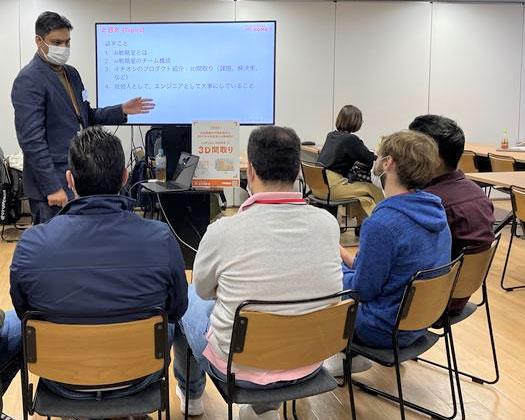
Participants listening intently at the roundtable discussion.
In the afternoon, the support team members and participants were divided into five groups. After self-introductions, a NASA game[2] was held as a group work to bring the groups closer together. The main language used was Japanese, so the participants tried their best to communicate their opinions to the team in Japanese. After checking the answers, the team members had a time to think about each member’s strengths that they noticed during the group work including him/herself, and shared their feedback to each other in the group.
The participants listened to the feedback to them attentively. They looked happy and embarrassed when their own strengths matched the strengths recognized by others, and joyful and confused when they differed.
[2] Consensus game, a type of team building game. The aim of the game is to recognize the importance of working together as a team by building consensus. It is said that it was originally developed as a recruitment test for astronauts by the National Aeronautics and Space Administration (NASA) with social psychologists and others.
In fact, all the sessions were carefully planned by the Support Team "to improve Japanese communication skills in order to experience building relationship with Japanese people, and to deepen understanding of Japanese way of working and working culture, and to obtain job offers”. For example, job presentations and roundtable discussions with employees were designed to “help participants, who tend to narrow their choices when they search company to apply by focusing only on industries that interest them or are related to their research field, to understand how Japanese companies are structured with different departments and what those department actually do, so that they can learn that companies seem not relevant to them might be choices to apply”. In the NASA game, participants “experienced of sharing their opinions in both English and Japanese” and enjoyed it. But the main objective was self-understanding through self-analysis by the feedback session in which they were able to “objectively review their strengths and weaknesses that they saw during the group work”.
Reflecting the one-day visit, some participants shared their comments such as “I thought LIFULL Co., Ltd. was a rental housing information service company, so I didn’t know they were using IT technologies in such a variety of businesses.”, “NASA game was fun. It was also very meaningful to be able to speak a lot of Japanese with Japanese people, to learn a new language, and to rediscover my own strengths”, and “I usually don’t have a chance to know my own strengths and weaknesses, so when I was asked about them in interview practice, I couldn’t answer well. Now, I could objectively see my own strengths and weaknesses through today’s work”.
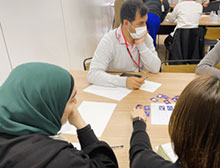
During group works
12 Support Team members contributed to this project.
We asked two of them about their impressions of JISR participants and this special event.
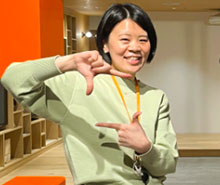
Ms. Yiqun Gong from LIFULL Co., Ltd.
She mainly engaged in this event.
About this event
We planned this event mainly aiming to provide an opportunity for JISR participants to know about Japanese companies because most of them might not be familiar with Japanese companies well and have less opportunity to interact with Japanese employees except of those who have experienced internship.
We hoped that they became aware of the importance of having a good match with the mindset and vision of the companies by telling them what the companies’ values are when hiring human resources, and the importance of working as a team by learning how employees actually work in team in Japan.
About JISR Participants
I felt that JISR participants are all very intelligent. Therefore, I want them to have confidence and not to give up. Making good relationship and working with Support Team will be a good help for them to be able to explain their own strengths and smartness in job hunting. Furthermore, I believe that sociability will lead to the good results of job hunting, so another advice for them is to train to be social and use it in job hunting.
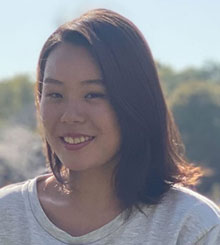
Ms. Minami Nishiyama, a member of the Support Team who was previously involved in the team of individual participant’s support and is now in charge of the event planning team (Deloitte Tohmatsu Consulting LLC.)
Changing Team from Individual Support to Event Planning
One of the advantages of the individual support is that one-on-one custom-made support for each participant is available. However, at the same time, I felt that this support was limited. In particular, I felt that it was too late for the participants to have a sense of crisis about not having found a job when they would be busy submitting their master's thesis, just some months before the graduation. Therefore, the Support Team discussed and decided to plan an event to inspire participants each other at an early stage, not only individually but also collectively. I found it interesting to plan an event that would benefit not only the individual participants but more to the whole group. Thus, I decided to be engaged in the event planning team.
About the Event
This event was implemented along two axes: to help the participants acquire sociability and familiarize with the Japanese job hunting process and improve their job hunting skills. We will continue planning events along with these two axes.
Since this was the first event we planned and was conducted face-to-face, we focused on interpersonal communication. In fact, we believed that during the workshop, as we communicated more with the participants, we were able to identify more strengths and areas in need of improvement.
For example, during the workshop, I found that one participant had the ability to listen carefully to others' opinions and summarize them. However, he was not aware of it, so it was good that I could tell him during the feedback session.
On the other hand, what they need to improve are Japanese language skills. I felt that the level of Japanese language skills was quite different from one another. While some participants tried to speak actively by composing sentences using simple words and thinking how they can convey their message even though they were not able to speak fluently, others spoke far more English than they did in Japanese. Language skills are not something that can be acquired immediately, but I believe that they will be able to improve it by acknowledging that they can communicate with others even with their current Japanese language skills if they try and make efforts to communicate. I would like to encourage those participants who were not able to communicate well in Japanese this time to do their best, as communicating one's opinion in Japanese is an essential skill for job hunting.
About JISR Participants
The first thing I felt when I was supporting 1st and 2nd batch participants was that JISR participants have high individual characteristics and skills. On the other hand, the big issue was that they were unable to explain their potential skills and ambitions because of lack of Japanese language skills and Japan's unique style of job-hunting. As soon as they started speaking Japanese, they could not express themselves as they wanted that they could do so in English. Their faces became stiff and they felt frustrated by the high language barrier. I advised the participants I was supporting to communicate actively in Japanese with a positive attitude, even if they made mistakes. As a result of repeated practices, those participants received employment offers, and I was so happy about it. My first impression of 4th and 5th batch participants that I met this time was that they were very enthusiastic about what they were interested in. However, some of them still need to change their behavior, which is natural in Japan, even though it is difficult for them due to cultural differences. We would like to help them realize and improve their behavior through events we plan in the future.
I know it is very difficult to find a job in a different culture and language, but I believe that all participants have potentials to play active roles in Japanese society. We hope that they will move forward with confidence in their skills and experience and not to be discouraged by difficult situations. Support Team will continue to work together to provide support to JISR participants who have chosen Japan among many other countries.
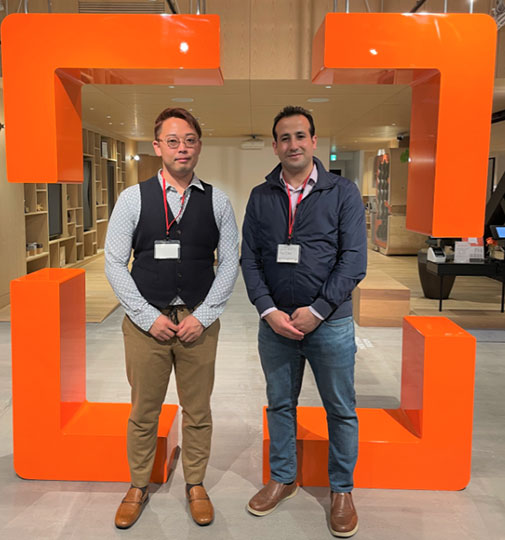
Mr. Kazuhiro Sekiyama from Support Team (Deloitte Tohmatsu Consulting LLC.) and Mr. Wahabi, 4th batch participant.




scroll